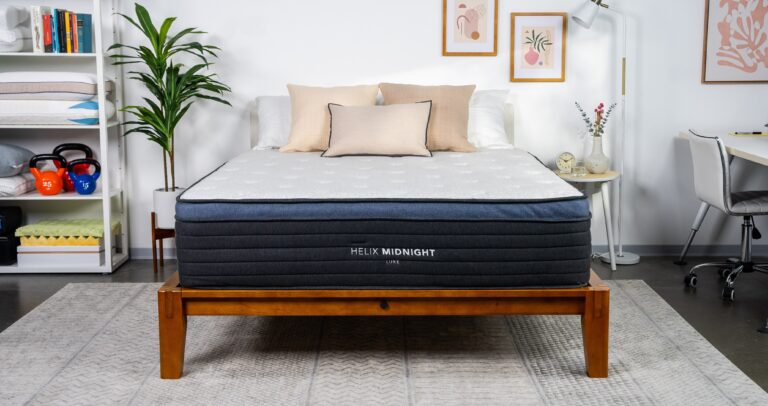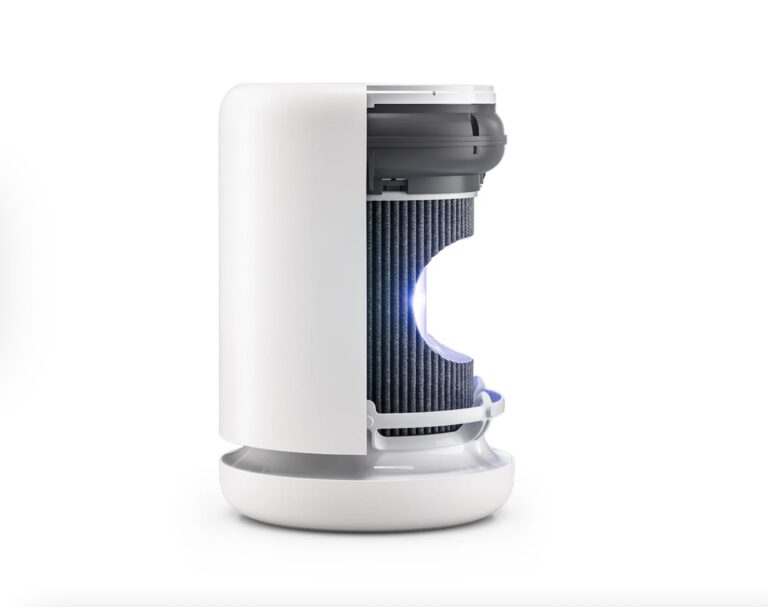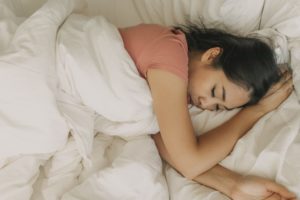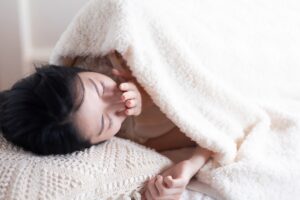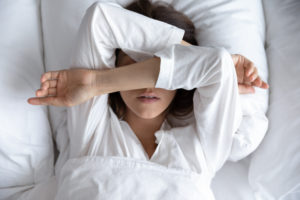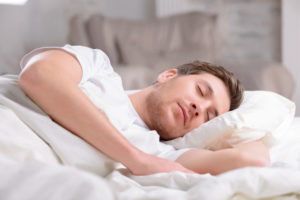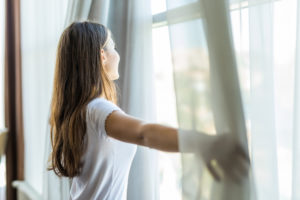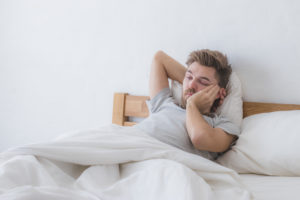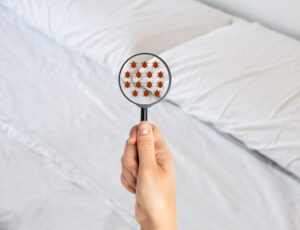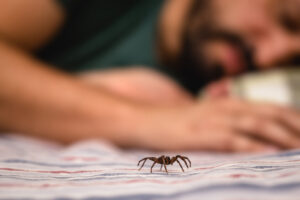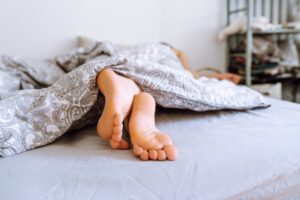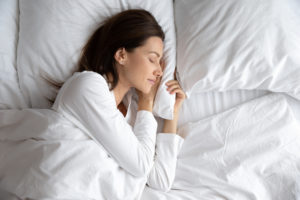When you buy through our links, we may earn a commission. Products or services may be offered by an affiliated entity. Learn more.
Is Sleeping With a Fan On a Good Idea?
Turning on a bedside fan at night is a common way to stay cool while sleeping. Some sleepers also find the sound created by a fan to be soothing, or they enjoy the comforting feel of the airflow. While sleeping with a fan on is generally considered safe, it may present some disadvantages for those with allergies or sensitivity to ambient noise.
We examine some of the side effects and benefits of sleeping with a fan turned on. For those who prefer not to use a fan, we discuss alternative options for keeping cool at night.
Looking to improve your sleep? Try upgrading your mattress.
Side Effects of Sleeping With a Fan On
Sleeping with a fan on is fairly harmless for most people, but some may find it uncomfortable. This is especially true for people with sensitive airways and those who prefer a totally quiet sleep environment. Other considerations when deciding whether to sleep with a fan include the cost of running it at night.
Aggravating Allergies
Fans can spread dust and other allergens around the room. For people with allergies, breathing in these allergens can impact the quality of their sleep .
Allergies to dust, pollen, and animal dander can cause uncomfortable symptoms such as a runny nose, itching, and coughing. For some, nasal congestion from allergies may also exacerbate asthma symptoms, snoring, or episodes of obstructive sleep apnea. Obstructive sleep apnea is a sleep-related breathing disorder in which breathing is interrupted during sleep.
Even after a fan is turned off, household allergens can linger in the air or settle on surfaces like fan blades and bedding. Keeping the bedroom and fan blades clean, or using a high-efficiency particulate air (HEPA) purifier, may help filter some allergens out of the air.
Extra Noise
Though many people enjoy the sound of white noise while sleeping, others may find the sound of a fan irritating or distracting. Research suggests noises as low as 48 decibels, and potentially those as low as 33 decibels, can have noticeable effects on sleep .
A fan’s noise level varies based on factors like the type and speed at which the fan is set. For comparison, a soft whisper is about 30 decibels , and an air conditioner is around 60 decibels. Repeated nighttime awakenings or waking up in the morning feeling unrested may be indications that a fan is too loud.
Cost
While using a fan is generally more cost-effective than leaving the air conditioning on, people may still see an uptick in their energy bills. For those who want to leave the fan on all night, finding a fan with low wattage and putting it on the lowest setting can minimize the expense.
Benefits of Sleeping With a Fan On
Sleeping with the fan on has several potential benefits, especially for those who live in warmer climates, those who tend to overheat at night, or those who like the soothing sound of steady background noise.
Helps Maintain a Comfortable Sleep Environment
For those trying to sleep when it is hot, a fan may be a good option for keeping the air circulating without the elevated cost of running an air conditioner. A fan is also practical for people in urban areas who prefer to keep windows shut because of street noise.
A bedside fan can be particularly useful for people going through menopause or cancer treatment , as the cooling breeze can be helpful during nighttime hot flashes. A fan can also make the room more comfortable when someone has a fever.
Provides White Noise
Leaving the fan running at night is an easy, cost-effective source of white noise. Many people experience interruptions to sleep due to noise from traffic or bed partners. The goal of white noise is to soften the impact of these sudden, unexpected noises so the person’s sleep is not interrupted.
In addition to noises that come from outside, approximately 1 in 10 American adults occasionally experience tinnitus, a ringing sound that comes from inside the ears. Tinnitus can make it difficult to sleep, but a fan may help mask the sound so the ringing is less distracting.
Keeps the Bedroom Fresh
Because it circulates air, a fan can also help make the room less stuffy. Fans may be especially useful for creating airflow and preventing stagnant air in bedrooms that have small windows.
Tips For Using a Fan While Sleeping
There are several ways to optimize the use of a fan while sleeping while minimizing the potential side effects.
- Purchase a portable fan: While ceiling-mounted fans are effective for circulating air in a room, they don’t offer as many options in terms of placement. A portable fan allows sleepers to move the fan from night to night depending on their needs and preferences.
- Avoid putting the fan too close: Those who find it uncomfortable to sleep with the fan blowing directly at them may want to put it farther away or set it on a rotating function.
- Keep the fan clean: To reduce the spread of dust and other allergens around the room, be sure to clean the fan regularly, including the blades. For compatible models, installing an air filter can help reduce airborne particles.
- Use a timer: Some people may prefer to use a fan only to help them fall asleep. In this case, setting a timer can prevent the fan from staying on all night.
- Choose a quiet model: While white noise is comforting for many sleepers, too much noise at night can disrupt sleep even when people are not consciously aware of it. If possible, invest in a relatively quiet style or model.
Other Ways to Keep Cool at Night
For those who prefer not to use a fan while sleeping, there are other methods for lowering the bedroom temperature at night.
- Use cool bedding and pajamas: Loose clothing and cooling bedding made from breathable fabrics such as cotton can encourage body heat to escape rather than build up overnight. For those who are feeling overheated, it may also help to eliminate extra blankets and clothing.
- Invest in a cooling mattress and bedding:Cooling mattresses and cooling pillows are made of materials designed to stimulate airflow around the sleeper’s body. For those who are not ready to invest in a new mattress, another option is a cooling mattress pad, which may use gel beads, water tubes, or other technology to reduce heat buildup.
- Shower before bed: Research suggests that taking a warm shower or bath approximately one to two hours before bedtime optimizes circulation and helps the body cool down for sleep.
- Cool down the bedroom during the day: If bedroom windows face the sun, blackout curtains may help keep the heat out in summer. In the evening, opening the windows and doors a few hours before bedtime can further cool down the room.
- Turn on air conditioning: Air conditioning offers a way to control the exact temperature of the room, and may be an option for those who find a fan too noisy. Most people find that the best temperature for sleep is slightly on the cooler side, between 65 and 68 degrees Fahrenheit.

Still have questions? Ask our community!
Join our Sleep Care Community — a trusted hub of sleep health professionals, product specialists, and people just like you. Whether you need expert sleep advice for your insomnia or you’re searching for the perfect mattress, we’ve got you covered. Get personalized guidance from the experts who know sleep best.
References
11 Sources
-
Koinis-Mitchell, D., Craig, T., Esteban, C. A., & Klein, R. B. (2012). Sleep and allergic disease: a summary of the literature and future directions for research. The Journal of allergy and clinical immunology, 130(6), 1275–1281.
https://pubmed.ncbi.nlm.nih.gov/22867694/ -
Wilson, J. M., & Platts-Mills, T. A. E. (2018). Home environmental interventions for house dust mite. The Journal of Allergy and Clinical Immunology: In Practice, 6(1), 1–7.
https://pubmed.ncbi.nlm.nih.gov/29310755/ -
Romano, M., James, S., Farrington, E., Perry, R., & Elliott, L. (2019). The impact of perennial allergic rhinitis with/without allergic asthma on sleep, work and activity level. Allergy, Asthma, and Clinical Immunology, 15, 81.
https://pubmed.ncbi.nlm.nih.gov/31827545/ -
Matsui, E. C., Abramson, S. L., Sandel, M. T., Section on Allergy and Immunology, & Council on Environmental Health. (2016). Indoor environmental control practices and asthma management. Pediatrics, 138(5), Article e20162589.
https://pubmed.ncbi.nlm.nih.gov/27940791/ -
Halperin D. (2014). Environmental noise and sleep disturbances: A threat to health? Sleep Science, 7(4), 209–212.
https://pubmed.ncbi.nlm.nih.gov/26483931/ -
National Center for Environmental Health. (2022, November 8). What noises cause hearing loss? Centers for Disease Control and Prevention., Retrieved December 19, 2022, from
https://www.cdc.gov/hearing-loss/causes/index.html -
Minos, S. (n.d.). Stay cool for less money with a ceiling fan. U.S. Department of Energy., Retrieved December 19, 2022, from
https://www.energy.gov/energysaver/articles/stay-cool-less-money-ceiling-fan -
U.S. Department of Energy. (n.d.). Estimating appliance and home electronic energy use., Retrieved December 19, 2022, from
https://www.energy.gov/energysaver/estimating-appliance-and-home-electronic-energy-use -
PDQ Supportive and Palliative Care Editorial Board. PDQ hot flashes and night sweats: Patient version. National Cancer Institute. Updated July 29, 2021., Accessed January 12, 2022.
https://www.cancer.gov/about-cancer/treatment/side-effects/hot-flashes-pdq -
NIH News in Health. (2022, May). Noise complaints. National Institutes of Health., Retrieved December 19, 2022, from
https://newsinhealth.nih.gov/2022/05/noise-complaints -
Caruso, C. C., & Chosewood, L. C., The National Institute for Occupational Safety and Health. (2020, June 29). Improve sleep: Tips to improve your sleep when times are tough. Centers for Disease Control and Prevention., Retrieved December 19, 2022, from
https://blogs.cdc.gov/niosh-science-blog/2020/06/29/sleep-hwd/

